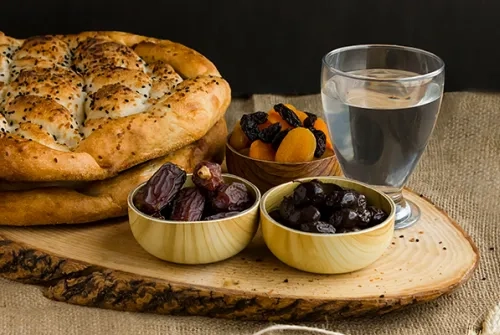Alo Yeditepe
Alo Yeditepe
Healthy Nutrition Suggestions during Ramadan
Yeditepe University Kozyatağı Hospital Nutrition, Diet and Phytotherapy Specialist Buket Ertaş Sefer said, "Overeating may lead to increased stomach acid and symptoms of indigestion." Stating that difficulty in digesting the consumed foods may be due to any gastrointestinal system disease, our expert said, "If you say 'I normally have nothing, it only happens at ‘‘‘‘İFTAR’’’’', it is useful to be merciful with an empty stomach after a long fast." He evaluated the most common causes of indigestion after ‘‘İFTAR’’.
You should not eat on an empty stomach during ‘‘İFTAR’’ meal
Emphasizing that the first thing to consider is to question the existence of a person's sensitivity to any food, our expert said, "The most common examples we see are lactose and gluten intolerance. It would be beneficial for those who are sensitive to these ingredients before Ramadan to pay extra attention at ‘‘İFTAR’’ time. However, 'normally there is no "If you say 'I don't have anything, it only happens at ‘‘İFTAR’’', it is useful to be reasonable with an empty stomach after a long fast," she said. In the information she shared about the factors that may cause indigestion during Ramadan, our expert underlined that eating excessive amounts of food with a feeling of hunger at ‘‘İFTAR’’ time can cause strain on the digestive system and said: "Eating excessively can lead to increased stomach acid and symptoms of indigestion. Since ‘‘İFTAR’’ times are short, , some people may try to eat their meals quickly. Eating quickly can put a strain on the digestive system and negatively affect the digestion process. Heavy and fatty foods are often consumed at ‘‘İFTAR’’ tables. Such foods can make digestion difficult and increase symptoms of indigestion. Fasting limits water intake throughout the day.
Dehydration can affect the digestive process and make it difficult to regulate stomach acid. During Ramadan, energy levels may drop and physical activity may decrease throughout the day. Low levels of physical activity can slow down the digestive process. Some people may experience stress and anxiety during Ramadan, especially as it gets closer to ‘‘İFTAR’’ time. "These emotions can negatively affect the digestive system and lead to symptoms of indigestion."
Pointing out the importance of taking care to eat a balanced and healthy diet during Ramadan in order to avoid indigestion, our expert said, "Choosing light and easy-to-digest foods for ‘‘İFTAR’’ and ‘‘SAHUR’’ meals, eating meals slowly, drinking plenty of water and doing regular physical activity can reduce the risk of indigestion. However, "If you experience serious indigestion problems or if they persist for a long time, it is important to consult a healthcare professional.’’ As her statement.
Choose Only One of the Pita-Rice Duo for ‘‘İFTAR’’ Meal
Buket Ertaş Sefer, in her information on how to start eating without damaging the body's digestive system after a long period of fasting, said that the best way to get the body accustomed to food is to start with water at room temperature and soup that is not too hot.
Pointing out that cooked vegetables and vegetable dishes with meat are among the most ideal main course alternatives, our expert said: "It is beneficial to choose only one of the pita and rice duo. Excess carbohydrates can make digestion difficult. If red meat is to be consumed, there must be a cooked vegetable with it. Food Consuming salad afterward is an alternative. After breaking the fast with water, if possible, avoid consuming water between meals as it will contribute to digestion. Instead of carbonated drinks, you should use beverages such as ‘‘AYRAN’’ and ‘‘KEFİR’’
To relieve heat, ‘‘AYRAN’’ can be made with a small amount of mineral water and yoghurt.In general, the things that must be consumed between ‘‘İFTAR’’ and ‘‘SAHUR’’ are fruit and one of its derivatives (fresh fruit, compote and compote), plenty of water, foods that will help fill our protein deficit if we cannot get protein at ‘‘İFTAR’’ (protein bars and similar), plants that will be good for indigestion, provided that excess amounts are avoided herbal teas . We often encounter the expression of weight loss after eating after ‘‘İFTAR’’, after a long fast. A short walk before consuming something for indigestion will always be a good start. "You can benefit from fennel and ginger teas, which reduce gas and are good for digestion."
Fluid Consumption During and After ‘‘İFTAR’’ Meal is Important
Underlining that living actively, working and being physically active during the day causes water loss to increase even more, the Nutrition and Dietetics Specialist stated that the person constantly loses water through sweat, urine and respiration and said, "We have a limited time to compensate for this." Since we are very swollen right after ‘‘İFTAR’’, we cannot start compensating quickly, and if we go to bed early, there is no time to drink water. Therefore, it will be much more beneficial in terms of digestion and absorption by drinking water sip by sip after ‘‘İFTAR’’, without waiting for thirst, instead of drinking a few glasses of water at once.
In addition, foods with a high water content (lettuce) "Making a salad from vegetables (such as pineapple, cucumber) will also contribute to our water level. The biggest enemy of hydration is diuretic liquids. If we consume less drinks such as tea and coffee, which will facilitate water excretion from the body, we will also contribute to our liquid rate." made her assessment.
How to Eat During Ramadan?
Our Nutrition and Diet Specialist gave advice on general health and nutrition that will help fasting people cope with indigestion and continued: "First of all, be aware of whether there is a disease in your digestive system and be sure to have it examined at regular intervals. Digestion is not only a physical event, it is a stress-related event." Even your stress level can disrupt your digestion. Try to consume as happy meals as possible. If you do not have a wound or any disease in your stomach, make sure that your stomach acid is sufficient.
Do not drink stomach protectors unnecessarily. Include foods such as apple cider vinegar, beet kvass, and homemade pickles on your table. Do not eat fried, excessive sugar and floury foods. If you have gluten sensitivity, try using basmati rice, buckwheat or quinoa instead of bulgur or white flour. After ‘’İFTAR’’, take a light walk on a straight road "If you don't have the opportunity to go out, you can take walks at home that suit you,"
This content was prepared by Yeditepe University Hospitals Medical Editorial Board.
”
See Also
- What is Collagen? What are the Benefits of Collagen?
- What Are the Benefits of Eating Fish? How to Choose Fresh Fish?
- How Should We Eat for a Healthy Gut?
- How Should Diabetes Patients Eat?
- What is the Lipedema Diet?
- What is Vitamin A? What are the benefits of Vitamin A?
- What is Black Cumin? What are the Benefits of Black Cumin Oil?
- What is Glutathione? What are the Benefits of Glutathione?
- What is Alpha Lipoic Acid? What are the Benefits of Alpha Lipoic Acid?
- What is Curcumin?
- Tips to Restore Balance to Your Body After New Year's Eve!
- The Relationship Between Gut Microbiota and Obesity
- Benefits of Water
- Benefits of Night Fasting
- 9 Tips to Enter the New Year Without Gaining Weight
- Control Your Weight During the Holiday with Small Adjustments in Your Habits
- Why Are We Hungry at Night?
- Foods to Help Quench Your Thirst on Summer Days
- Superfoods
- 8 Important Benefits of Dry Legumes
- Nutrition Recommendations for Diabetes Patients
- Mushroom Poisoning
Alo Yeditepe



